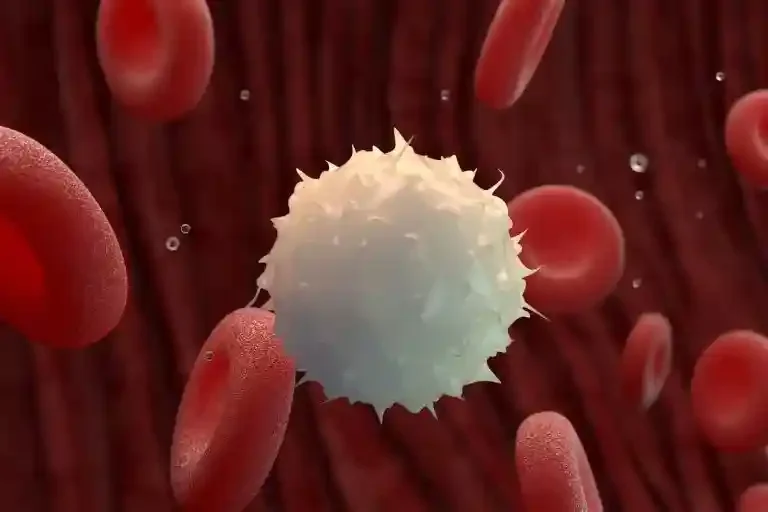Blood cell formation and function are both impacted by blood cancers. The majority of the time, blood cancer starts in the body’s bone marrow responsible for the production of blood. Stem cells, produced in the bone marrow, eventually develop into RBCs (red blood cells), WBCs (white blood cells), & platelets. Normal blood cells are in charge of preventing infections, supplying oxygen to every part of the body, and controlling bleeding.
However, in the case of blood cancer, an aberrant form of blood cell grows uncontrollably in the majority of medical complications, disrupting the process of normal blood cell development. As a result, these cancerous or aberrant blood cells overwhelm the healthy blood cells, causing several kinds of symptoms and medical problems.
Types of Blood Cancers
Blood cancers often fall into one of three types:
- Leukaemia – Leukaemia is a form of blood cancer developing in the bone marrow and blood. It takes place when the body overproduces abnormal white blood cells, which disrupts the bone marrow’s capability to produce platelets and RBCs.
- Lymphoma – It is a particular kind of blood cancer that impacts the lymphatic system, which eliminates extra fluid from the body and generates immune cells. White blood cells called lymphocytes are one kind that fights infection. The abnormal lymphocytes that develop into lymphoma cells proliferate and gather in your lymph nodes and other organs. Our immune system is weakened over time by these cancerous cells.
- Myeloma – It is a plasma cell cancer. White blood cells (WBCs), called plasma cells, create antibodies in the body that ward off infections and sickness. Our body’s immune system is compromised and more vulnerable to infection as a result of myeloma cells that stop the body from producing antibodies normally.
Signs and Symptoms of Blood Cancer
Blood cancer symptoms differ depending on the kind, although there are several blood cancer symptoms that are present in all three types:
- Being unable to manage everyday tasks due to extreme exhaustion and weakness.
- A persistent fever indicates that the body has been fighting an infection or reacting to aberrant cancer cells.
- Drenching night sweats.
- Bleeding that doesn’t stop, and bruises that don’t go away after two weeks.
- Unexplained weight loss is defined as a 10-pound loss of weight that occurs unexpectedly or without cause during a six- to 12-month period.
- Leukaemia and myeloma can both result in painful patches or bone pain.
- Lymphoma or leukaemia symptoms include swollen lymph nodes, an enlarged liver, or an enlarged spleen.
- Frequent infections that might be an indication that something is wrong with the immune system
If there are any indications or signs of blood cancer that don’t go away, schedule a visit with the doctor.
What Causes Blood Cancer?
Blood Cancer occurs when the DNA of growing blood cells, primarily white blood cells, is damaged. The blood cells then expand and divide in an irrational manner. Healthy blood cells typically expire after some time and are replaced by the new cells that develop in the bone marrow. The blood cells in blood cancer grow too fast, do not function properly, and do not naturally die at a certain point in their life cycle. Instead, they grow and occupy more room. Cancer cells start to populate the blood as the bone marrow produces more of them, which stops the healthy white blood cells (WBCs) from developing and performing as they should. It also impacts red blood cells (RBCs) and platelets. Cancerous cells eventually outweigh healthy cells in the blood.
Blood cancer is frequently caused by unknown mechanisms; however, environmental and genetic variables almost certainly play a part. Blood cancer causes may not be some genetic trait, but they may increase the likelihood that it may manifest under particular circumstances, such as after exposure to certain chemicals or diseases.
Blood cancer causes will vary based on its kind. While certain blood cancer causes may be avoided, others cannot. The causes of blood cancer include:
- Exposure to ionising radiation, such as that experienced during radiation therapy for a prior cancer or being close to a nuclear weapons testing site.
- Being overweight or underweight at birth.
- Having had one form of blood cancer previously.
- Exposure to benzene.
- Being a male, as blood cancer is more common among males
- Exposure to pesticides and pollution in the air.
- Being born to parents who smoke
- Having a caesarean delivery prior to the onset of labour.
- A background of certain illnesses, including the Epstein-Barr virus.
Conclusion
Significant improvements have been made in medical science to make the treatment of blood cancer effective. Wockhardt Hospitals is renowned for its innovative technology, extensive experience, and tailored treatment plans. Furthermore, the hospital is home to one of India’s leading specialists in the field of blood cancer, who is responsible for the entire range of patient care. Make an appointment online with the best blood cancer hospital in India right now if you are experiencing any signs of blood cancer.
FAQs on Blood Cancer
Q. What are the causes of Leukaemia?
According to researchers, DNA alterations that are brought on by a combination of inherited and environmental variables cause leukaemia. In this instance, scientists believe that chromosomal alterations may be the cause of DNA modifications. Strands of DNA make up chromosomes. These DNA strands are duplicated when cells split to form two new cells. Genes from one type of chromosome can occasionally move to another, and this transition might have an impact on a group of genes which promote cell growth & a different group of genes that repress tumours in leukaemia. The genetic alterations which lead to leukaemia are highly influenced by exposure to high doses of radiation or certain chemicals.












